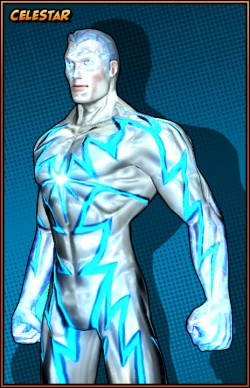Celestar
Background
Celestar has lived a very long and complicated life. He is one of the longest living superheroes alive today, thanks to the nature of his energy powers. Due to an early tragedy in his superheroing career, Celestar also suffers from classic survivor’s guilt.
He became a superhero in the early 1960s, when, as a young physics grad student in Canada, named Lonnie Lawrence, he came face to face with the Land, greatest of all the spirits of the North. Sensing in him dormant mutant powers, the Spirit of the Land offered to awaken his powers if he would battle the ancient evil of Kigatilik.
Lonnie agreed without bothering to think twice. Of course he wanted to be a superhero and do great deeds! Of course he wanted to travel the world, saving lives. It was all much more exciting that studying for quals.
The Land woke in him the power of the Stars. His dormant energy powers flared into being all around him. He could emit bursts of cosmic rays, or teleport himself faster than light, and withstand almost any type of damage. The Land united him with three other superheroes: Timberline, Bonne Vivian, and Kivioq. Together, they became known as the Mighty Canadians. They fought the servants of Kigatilik, as well as most other prominent Canadian villains. At a final, fateful showdown with Kigatilik, they were able to trap that ancient evil in the Tomb, an icy prison so cold even he could not break free. It came at great sacrifice, however. Of all the Mighty Canadians, only Celestar escaped the Tomb. The others were frozen within that prison.
In the years that followed, Celestar was consumed with guilt. Why had he escaped, while his friends had not? And how could he allow them to stay trapped in that prison? He attempted to free them. He attempted to reason with the Land, but it told him that to free them would be to loose Kigatilik on the world again, and it would not do that. He consulted sorcerers and superheroes, but none could help him free his fellows. He became withdrawn and antagonistic in his frustration. The media, irritated by his attitude, began to question his involvement in his teammates’ disappearance. They wondered if perhaps he had killed his fellow Mighty Canadians. Frustrated and burnt out, Celestar left Earth for the stars.
No one knows precisely what happened to him in his years traveling the cosmos. Only that he eventually came back to Earth a changed man in the 1980s and settled near Detroit. He began life anew. He fell in love and started a family. He also began to teach physics at a community college. His life was no longer about being a superhero, although he did help fight crime. He was grounded in a way he never had been before. Unfortunately, his troubles with the press continued. Upset at his interference in recent criminal endeavors, a mob boss got local newspapers to run stories about Celestar being “anti-American.” That provoked a huge public outcry against Celestar, and he was no longer welcome in Detroit.
Sadly, that backfired tremendously. Had Detroit asked Celestar for help, the Battle of Detroit might have had a very different ending. As it was, no one was able to stand against Doctor Destroyer when he attacked. Celestar would have had a much better chance, and he very easily could have turned the tides of that battle early on. Instead, he joined late in the battle and pushed himself for days afterwards trying to salvage the city. Celestar pushed himself far too hard in the aftermath of the Battle of Detroit. He developed quite a case of Post Traumatic Stress. Within a year, he’d collapsed of a nervous breakdown and been hospitalized for treatment.
It took Celestar years and hard work to rebuild himself. He, like Mayte Sanchez, has spoken openly about the psychological damage superheroing can cause, and about the need for therapy to recover. He was able to return to teaching and superheroing, and has become one of the most prominent Canadian superheroes again.
About
Celestar is a superhero, through and through. He will sometimes push himself too hard out of a sense of guilt; the tragic loss of his teammates leaves him feeling the constant need to prove himself and make up for being unable to free them. Recently, he has learned that his teammates are not, in fact, frozen in stasis, but are suffering the torments of an icy hell. His desperation to free them has increased to near epic proportions. With Kigatilik on the loose again, in particular, he feels the loss of his teammates even more bitterly. Their sacrifice was for nothing if Kigatilik roams free.
